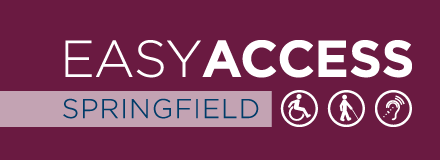Travel Tips
The goal of Easy Access Springfield is to put resources at your fingertips that will make planning an accessible trip to Springfield as easy as possible. To smooth your travel getting here, we also offer you the following tips and sources of information.
Air Travel
Before you fly, learn your rights under the Air Carriers Access Act (the ADA for air travel). A new version of the Part 382 ACAA regulations, which became effective in May 2009, now applies to foreign carriers serving the US as well. See the Resources list below for several good sources of information and guidance including the Aviation Consumer Protection website and United Spinal's "Accessible Air Travel."
Make your reservation and special service requests (SSRs) as far in advance as possible. Specify exactly what you need such as an escort or wheelchair assist to the gate, assistance in boarding (aisle chair), onboard aisle chair to reach the restroom or aisle seat with a moveable armrest. Inform the airline if you are traveling with a wheelchair or scooter and be prepared to give details such as battery type, dimensions and weight. Call back 48 hours prior to departure to confirm they have a record of your SSRs. We also recommend that you check in at the ticket counter and again at the gate if you have special service requests.
48-hour advance notice may be required only for medical oxygen, stretcher service, respirator hook-up, wet cell batteries, transport of a power chair on an aircraft with less than 60 seats and for groups of 10 or more passengers with disabilities.
Numerous types of oxygen concentrators have now been approved by the Federal Aviation Authority. For a full list and other useful information, see the Advanced Aeromedical website (www.aeromedic.com). Among other obligations, the passenger must notify the airline of his or her intention to use the device, provide a physician's statement and bring sufficient batteries to cover 150 percent of the estimated flight time.
To ensure that travelers with disabilities have access to the types of seats they need, airlines must block an adequate number of bulkhead seats and aisle seats with moveable armrests. Prior to the last 24 hours before a flight departs, these bulkhead seats may be assigned only to individuals with a fused or immobile leg, someone traveling with a service animal and their travel companions. Blocked seats with moveable armrests may be assigned only to individuals who use an aisle chair to access the aircraft and cannot easily transfer over a fixed armrest.
Whenever possible, book a non-stop flight. For connections at large airports, allow at least 1-1/2 hours between flights. The extra time will allow you time to eat and use an accessible restroom, not available on most domestic flights as these are single-aisle planes. To expedite service on arrival, notify the flight attendant en route if you ordered a wheelchair assist or requested your equipment to be returned at the gate.
To help minimize damage to power chairs and scooters, attach a laminated set of instructions on how to prepare equipment for stowage. Arrive early at the gate to give baggage handlers enough time to safely move and stow the device. Remove and take on board anything not firmly attached and make sure you get your claim check. On a first-come, first-served basis, travelers using a folding-type manual wheelchair can ask to have it stowed in the cabin closet.
You may want to purchase insurance coverage for your wheelchair or scooter. On domestic flights, airline liability for assistive devices is limited to original purchase price; on international flights, to the same low amount per pound as all other baggage.
You can still have a friend or relative assist you to or from your gate. Contact the airline in advance to arrange for a gate pass. The individual must bring along a photo ID.
The Transportation Security Administration has specific guidelines for handling passengers with disabilities or medical concerns (866-289-9673, www.tsa.gov). Take a copy along and request a supervisor if problems arise.
Pack medicines and other medical supplies in carry-on luggage. The strict limitation on gels and liquids does not apply to prescriptions or other liquids needed by persons with disabilities or medical conditions. However, they must be packed separately and declared at the security checkpoint.
The airline limit of one carry-on and one personal item does not apply to medical supplies, equipment, mobility aids and assistive devices. These items are also exempt from checked baggage restrictions.
Under the ACAA, if a disability-related problem arises, you have the right to speak to a Complaints Resolution Official (CRO) employed by the airline. If still not satisfied, call the US Department of Transportation Toll-Free Hotline for Air Travelers with Disabilities at 800-778-4838 or 800-455-9880 TTY, available 7am-5pm Eastern Time.
Motor Coach Tours and Travel
Under ADA regulations for Over-The-Road Buses, all fixed route and charter service companies must, with 48-hour advance notice, provide lift-equipped service. This obligation holds whether or not the company owns their own accessible vehicles.
Lodging
To reserve an accessible room, call the property directly, not the central reservation number. Confirm that they will "block" the accessible room, i.e., put a hold on it. Should an adapted room nonetheless not be available when you arrive, let the manager know that it is their responsibility to find you accessible accommodation at the same price. This is one situation where knowing your rights and standing firm is imperative.
If you need basic adaptive equipment such as a shower bench or ADA kit with visual alerting devices, notify the hotel in advance, preferably in writing, so that they can reserve or acquire the items. For more specialized requests like a hospital bed or Hoyer lift, many hotels will help arrange rentals at your expense.
If reservations or front desk staff cannot answer specific questions about accessibility, ask to speak to either the head of engineering or housekeeping as they are more familiar with the adapted rooms.
Properties that offer free shuttle service to their guests are not required under the ADA to own their own accessible vehicles. They do, however, have to provide alternate accessible transportation at no charge for guests who use wheelchairs. To avoid a prolonged wait at the airport, make your request for accessible transport several days in advance of your arrival.
Thanks to a class-action lawsuit, Hotels.com and Expedia.com now provide basic access information for all properties they list. Once a reservation is made, customer service personnel will contact the hotel directly to see if the desired feature or type of accessible room is available and confirm the booking within 48 hours. If unavailable, they will attempt to locate an equivalent hotel at an equivalent rate that does have the requested feature. If no acceptable accommodation can be found, the purchase price will be refunded. While still not ideal, this does make it possible for travelers with disabilities to also take advantage of discounted hotel rates online.
Additional Resources
- Accessible Air Travel: A Guide for People with Disabilities
- Free publication from United Spinal. To order call 800-444-0120 or e-mail: publications@unitedspinal.org. Also available online: www.unitedspinal.org/pdf/Accessible_Air_Travel.pdf
- AccessAnything.net
- Adventure travel site and newsletter. Access_Anything_Traveler.pdf
- Aviation Consumer Protection and Enforcement, Department of Transportation
- Information for air travelers in general as well as publications, regulations and guidance specifically for those with disabilities including how to file a complaint. www.transportation.gov/airconsumer
- Barrier-Free Travel: A Nuts and Bolts Guide for Wheelers and Slow Walkers, Third Edition
- By Candy Harrington, 2009, 285 pages. $19.95 plus shipping. Also by the same author: 101 Accessible Vacations, There is Room at the Inn, and Emerging Horizons: Accessible Travel News. www.emerginghorizons.com
- Disabled Travelers
- Comprehensive site with links for specialized travel agents and tour operators, access guides and more. www.disabledtravelers.com
- Disaboom.com
- Informative website and clearinghouse for the disability community which includes travel tips and articles on specific destinations. www.disaboom.com
- National Aging and Disability Transportation Center
- Information on accessible community transportation including buses, taxis and paratransit. 800-659-6428, 202-347-3066 or 202-347-7385 TTY. www.nadtc.org
- Federal Transportation Administration
- The FTA Office of Civil Rights has a Toll-Free ADA Assistance line for questions or concerns regarding public transportation for persons with disabilities. Call 888-446-4511 (Voice) to leave a message or email them at FTA.ADAAssistance@dot.gov. Their website is also a useful resource: www.fta.dot.gov/civilrights/ada/civil_rights_3893.html
- Seatguru.com
- Seating charts and inflight amenities for airlines worldwide. www.seatguru.com
- Transportation Security Administration
- Detailed guidance for travelers with disabilities and medical conditions to help them prepare for airport security screening. www.tsa.gov/travelers/airtravel/specialneeds/index.shtm
- US Access Board
- Independent federal agency that develops design guidelines and standards under the ADA including for transportation facilities. Access Help Line: 800-872-2253 or 800-993-2822 TTY. www.access-board.gov
- US Department of Justice
- ADA Information Line: 800-514-0301 or 800-514-0383 TTY. www.ada.gov
- VacationsToGo.com
- Clearinghouse for discount cruises with detailed charts on the accessibility of cruise ships serving the US market. www.vacationstogo.com




